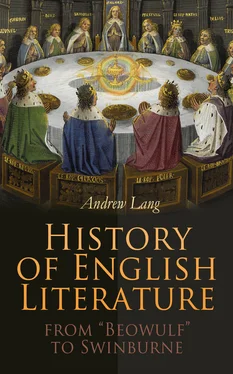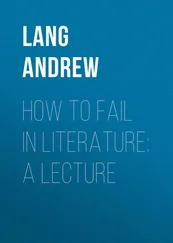As, in 1386, Chaucer had borne arms for twenty-seven years, that takes us back to 1359, when he went, under the standard of Lionel, Duke of Clarence, on a far from triumphant expedition of Edward III against France. He is unlikely, at that date (1359) to have been under 15 years of age; he may have been born as late as 1343, or anywhere between 1340 and 1343. The household accounts of the wife of the Duke of Clarence prove that Chaucer was a member of her household, and, in 1357, she, and Chaucer, were staying with John of Gaunt, at Hatfield, in Yorkshire.
In the campaign of 1359, when Chaucer bore arms, Edward III failed to take Rheims and Paris: he wasted the country vainly, and made peace, at Bretigny, in 1360. Somewhere and somehow Chaucer was taken prisoner by the French, whether in a skirmish, or while foraging, or when visiting his lady, or absorbed in a book, or meditating the Muse, and contending with the difficulties of rhyme. His captors thought that there was money in his case, or they would have knocked him on the head. There was money. Edward III paid, sixteen pounds, whether as the whole or as part of his ransom (1 March, 1360). The sum (equivalent to our £200) was not then insignificant for a youth not of noble birth, though, in 1368, an Esquire.
Account books show Chaucer (1367) as a valet of the Royal chamber, like Molière (and Shakespeare!) in France during the time of war in 1369; salaried by the King; a married man; pensioned by John of Gaunt in 1374, and receiving a daily pitcher of wine, commuted for money in 1378. In 1372-1373, he went on a mission to Genoa and Florence. Whether he then met the famous poet Petrarch or not, is uncertain: in his "Clerk's Tale," the Clerk says that he met Petrarch; it does not follow that Chaucer was so fortunate. In 1374 he got a good place in the Custom House, in the wool department, and, 1375-1376, had valuable gifts from the King. In 1377 he went on a mission to Flanders, and on another to France. Froissart the delightful chronicler mentions him in this connexion. In the following year he went on a mission to Visconti in Milan, and to the celebrated English commander of mercenaries, Sir John Hawkwood.
His experiences made Chaucer equally fit to sing of "the Court, the camp, the grove": his various posts in the Civil Service brought him acquainted with merchant-men, architects, all sorts and conditions of men. In 1386 he sat in Parliament for a division of Kent. Parliament made an attack on the Court, and Chaucer lost his offices, which he had for some time performed by deputy. Later he received valuable appointments, but by 1398 he needed and obtained royal protection from his creditors; probably he was never a frugal man, he was not in the best circumstances towards the end of his life, but neither Richard II or Henry IV let Old Grizzle starve. Henry was no sooner on the throne (30 September, 1399) than (3 October) he gave the poet a pension of forty marks and ratified a pension given by the ill-fated Richard five years previously. If Chaucer's wife, Philippa, was the sister of Catherine, mistress and (1396) wife of John of Gaunt, father of Henry IV, the poet had a friend in the Lancastrian party. But the fact is uncertain, unimportant, and a great cause of the spilling of ink. Chaucer died on 25 October, 1400.
We only know, as regards Chaucer's children, that he had a little boy, Lewis, whom, in his prose work on the astrolabe, he addresses in a style that makes us love him. He gives him, at his earnest prayer, an astrolabe and writes for him, in English, a little treatise on its use, "for Latin can'st thou but small, my little son". The poet, the friend of that less charming minstrel, "moral Gower," left a fragrant memory.
When we open Chaucer's works at the Prologue to the "Canterbury Tales," usually placed in the forefront, and when we remember the wilderness of long romances through which we have wandered, the happy change of scene, the return to actual human life, is surprising.
Chaucer is by no means free from the blemishes of "middle English" literature. If he is not to be called prolix in his narratives, "when his eye is on the object"—the main object,—he is none the less profuse in digressions. His mastery of verse was not born fully armed; he had to acquire it by effort, by experiment; he had to feel his way. An unusually large number of his poems are unfinished: some he seems to have abandoned, like the "Legend of Good Women," because he felt that he was on the wrong path; that his task was no longer pleasant to himself, and therefore certainly could not give pleasure to his readers. He was, at first, eager to impart information, as the early scops conceived it their duty to do. Gathering his materials from all sources, Latin, French, and Italian, he, in "The Book of the Duchess" (about 1369), makes the bereaved husband not only allude to many classical tales of sorrow, but actually give his authorities for each case; "And so seyth Dares Frights," or " Aurora telleth so". Even the old habit of preaching at great length, the habit of edifying, clung to Chaucer. He was a man of the world, the last man to risk martyrdom for any advanced theological ideas which he might be inclined to entertain; and not the first to suppose that any set of opinions contained the absolute truth. In his day a fierce attack was made against the wealth of the Church and the luxury into which many members of the Regulars, of the various monkish Orders, had fallen. The curse of a parson was no longer so much feared as it had been. The exhibition of saintly relics for money, the arrival of pardons "hot from Rome," could safely be derided. The friars had been the butts of the French authors of fabliaux , tales of coarse popular humour, for two centuries.
Such censures were not heterodox, they did not assail matters of faith, and the satire of Chaucer is always as good-humoured as it is humorous. To him the Pardoner and Summonour of the "Canterbury Tales," and the rest of the riff-raff of the Church are amusing knaves: he has Shakespeare's smiling tolerance for such a rogue as Parolles. He is earnestly sympathetic in his famous portrait of the good and gentle parish priest, a man of "true religion and undefiled," a man of "the Order of St. James," like the ladies in the "Ancren Riwle".
It were much more pleasant, perhaps more profitable, to linger over and lovingly enumerate the charms of Chaucer at his best, than to trace him through his early experiments to such masterpieces as the blending of old Greek romance and manners with the manners and romance of chivalry in "The Knight's Tale," and in "Troilus and Criseyde". But it is customary to trace the "making" of Chaucer, not only through his experiences of Court, and camp, and grove, and city, but through his literary work. It is certain that in youth he translated that great popular French poem, the "Roman de la Rose," for he says so in his prologue to his "Legend of Good Women". The French poem was begun by Guillaume de Lorris about a century before the birth of Chaucer, as an allegory on the refinements of the doctrine of Love, as taught in the Courts of Love. Guillaume says that he has the warrant of Macrobius, in his "Dream of Scipio," for supposing that dreams are not wholly to be neglected: so he dreams, of course in May, of how the birds sang, and how he walked beside that very stream which the author of "Pearl" borrowed, and converted into the River that sunders the living and the dead. He encounters allegorical works of art, representative of all things evil, outside the walls of a beautiful garden, within which are Love and all things good. The ideas have a sweet vernal freshness, on their first presentation, but by repetition become as artificial as those of the "Carte du Tendre," the map of Love's land which amused the "Précieuses," the affected literary ladies, in the youth of Molière (1650-1660). The dreamer desires a lovely Rose, watched by a squire "Bel Accueil" (Fair Welcome) and the adventures, and fables from Ovid, are of a kind so taking to mediaeval readers that henceforth every poet had his May dream, birds, river, Love, Venus, allegorical personages, and the rest of the "machinery". De Lorris left the lover in despair, but Jean de Meung continued the poem at enormous length, and in a spirit far from chivalrous: he introduced every kind of new heresy against the feudal ideals, and so began a controversy in which Gerson, who lived to befriend the cause of Jeanne d'Arc (1429) took up his pen in defence of Christianity and chastity.
Читать дальше












